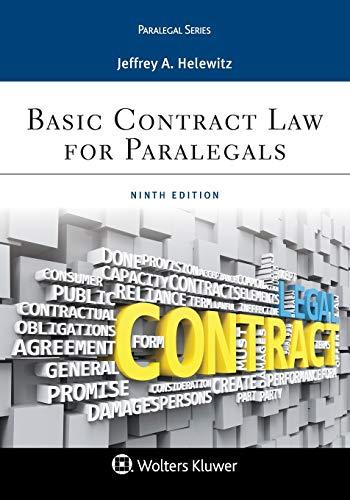This case arises out of a consent judgment entered by the district court in 1994 in which
Question:
This case arises out of a consent judgment entered by the district court in 1994 in which Gould, Inc. agreed to pay for environmental investigation and remediation of property sold by Gould, Inc. to Bay Corrugated Container, Inc. In 1999, Bay filed a petition to enforce the consent judgment and Gould, Inc. In its petition, Bay acknowledged that Gould, Inc.’s successor, GNB, Inc. (now Exide Technologies) had assumed Gould, Inc.’s responsibilities under the settlement agreement. The parties entered mediation and Bay entered into a settlement with Exide. In 2009, Bay filed a ‘‘Notice Requesting Resolution of Petition to Enforce Consent Judgment.’’ After soliciting status updates and holding a nonevidentiary hearing, the district court granted Gould, Inc.’s motion to dismiss. Relying on a determination by the Seventh Circuit that GNB assumed all of Gould, Inc.’s environmental liabilities when it purchased Gould, Inc.’s battery business in 1984, and Bay’s mediated settlement agreement with Exide, the district court determined that Gould, Inc. had no liability in this matter. In the alternative, the district court ruled that the ‘‘nine years of inactivity’’ in this case warranted dismissal under Federal Rule of Civil Procedure 41
(b) and Eastern District of Michigan Local Rule 41.2. Bay moved the district court to reconsider its dismissal; the district court denied Bay’s motion. In this same order, the court allowed Gould Electronics to respond to Bay’s motion for reconsideration and to intervene for purposes of appeal. The district court also allowed Gould Electronics to intervene on appeal. Bay appeals, arguing that dismissal of the petition was error. We REVERSE.
Bay argues that Gould, Inc. remains liable to Bay under the 1994 settlement and judgment. Bay also argues that Bay’s negotiation of the mediated settlement with Exide, in addition to other acknowledgments of GNB’s assumption of Gould, Inc.’s liabilities, does not show that Bay released Gould, Inc. Gould, Inc.’s continued liability to Bay depends upon whether there has been a novation that substituted Gould, Inc.’s liability with that of GNB or Exide. The resolution of this issue depends upon whether Bay’s discussions and negotiations with GNB and Exide actually extinguished its agreement with Gould, Inc. or whether GNB and Exide merely assumed Gould, Inc.’s obligations.
Under Michigan law, ‘‘[t]he elements of a novation require the creditor’s intention both that the new debtor assume the obligation and that the old debtor be released.’’ Consent to a novation ‘‘is not to be implied merely from the performance of the contract or the payment of money by the substitute, for that might well consist with the continued liability of the original party.’’
‘‘The circumstances surrounding a series of transactions may be considered, in addition to the text of any written instruments, in determining whether the parties reached a novation that extinguished the liability of one debtor and substituted for it the liability of another.’’
The district court based its dismissal on ‘‘its conclusion that [Gould, Inc.]
has no liability for the contamination at issue because its liability transferred to GNB’’ and Bay’s ‘‘extremely long period of inactivity warranted dismissal for lack of prosecution.’’ The district court thus implicitly found or assumed that there had been a novation of Gould, Inc.’s liability to Bay, transferring it to GNB or Exide. However, we find the record contains insufficient facts to support this conclusion.
We hold that it cannot be determined from the record whether there has been a novation and whether, as the district court determined, Gould, Inc. is no longer liable to Bay. Likewise, the district court’s summary dismissal under Rule 41
(b) does not allow us to review the appropriateness of the decision. For the foregoing reasons, we REVERSE the district court’s dismissal of the case and its denial of the motion for reconsideration, and REMAND for further proceedings consistent with this opinion.
Questions
1. According to the court, what is required under Michigan law to effect a novation? Is this the same requirement under your state’s law?
2. What was the basis of the district court’s implicit finding of a novation?
3. What would have to be shown to evidence a novation?
Step by Step Answer:






